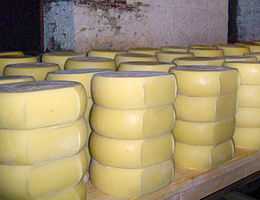Kashkaval
| Cașcaval | |
|---|---|
| Source of milk | Cow, Sheep |
| Pasteurised | Traditionally, no |
| Texture | Semi hard |
| Certification | Romanian Cașcaval have PDO status since 2005. |
Kashkaval deriving from the Italian caciocavallo (Romanian: cașcaval, Bulgarian: кашкавал, pronounced [kɐʃkɐˈvɑɫ], Macedonian: кашкавал, pronounced [kaʃkaˈval]; Turkish: kaşkaval/kaşar, Serbian: качкаваљ or kačkavalj; Albanian: Kaçkavalli) is a type of yellow cheese made of sheep milk. In Albania, Bulgaria, Republic of Macedonia, Serbia and Romania, the term is often used to refer to all yellow cheeses (or even any cheese other than sirene). In English-language menus in Bulgaria, "кашкавал" is translated as "yellow cheese" (whereas sirene is usually translated as "white cheese" or simply "cheese").
Romania
In Romania, cașcaval (Romanian pronunciation: [kaʃkaˈval]) is used to refer to a number of types of yellow semi-hard cheeses made of sheep's or cow's-milk. The term is often used by extension as a generic name for all semi-hard yellow cheeses such as the Swiss Emmental cheese, the Dutch Gouda and the British Cheddar, or anything that looks similar to cașcaval.
The name cașcaval comes from Latin caseus (cheese) and caballus (horse).[1]
Another theory exists. Some Slovenians historians said the Aromanian population, a native Balkan people (pejoratively Tzintars in Greek usage), created cașcaval. As in Romanian, the word caș means in Aromanian (Tzintar) language cheese. According the same theory, in the Italian name caciocavallo, the word cavallo (horse in English) would supposedly refer to the seasonal movement of the Aromanians with their horses and livestock between fixed summer and winter pastures (transhumance), contrasting with the widely accepted explanation of the word "cavallo" coming from the cheese being traditionally dried by attaching two gourd shaped balls of caciocavallo with a single rope and hanging them to a wooden pole as if placed on a horse's back .[2]
During the communist regime, because of the food shortages, Romanian housewives developed a technique for a homemade pressed cheese, similar to cașcaval, made out of milk, smântână, butter and eggs.[3]
Several sorts of the Romanian cașcaval have protected designation of origin (PDO)status in the European Union. As of 2005, the following types of cașcaval are PDO products of Romania:[4]
- Cașcaval de Argeș
- Cașcaval de Bobâlna
- Cașcaval de Brădet
- Cașcaval de Carei
- Cașcaval de Ciuc
- Cașcaval de Covasna
- Cașcaval de Dej
- Cașcaval de Dobrogea
- Cașcaval de Dorna
- Cașcaval de Fetești
- Cașcaval de Harghita
- Cașcaval de Hârlău
- Cașcaval de Mateiaş
- Cașcaval de Moeciu
- Cașcaval de Napoca
- Cașcaval de Penteleu
- Cașcaval de Rarău
- Cașcaval de Râuşor
- Cașcaval de Rucăr
- Cașcaval de Satu Mare
- Cașcaval de Sibiu
- Cașcaval de Târnița
- Cașcaval de Vidraru
In Romanian cuisine, a lot of dishes are made with cașcaval, like caşcaval pane or mămăligă cu brânză.
Bulgaria
In Bulgaria: Kashkaval made from cow's milk is known as Kashkaval vitosha while a variation made from ewe's milk is called Kashkaval balkan. Kashkaval preslav is the name given to the cheese made from a mixture of both milks.<http://www.cheese.com/kashkaval/>
Kashkaval is a traditional food used in most of the breakfast pastry. One of the most common dishes with kashkaval is kashkavalka which is a little pastry containing kashkaval inside and on top. Like in the other Balkan countries, it is a major substitute for all other kinds of cheese, especially in pizzas. Another popular Bulgarian snack is Princess (Bulgarian: принцеса) which is a grilled slice of bread topped with kashkaval or topped with pork mince and kashkaval.
Middle East

In Lebanon and Syria, this type of cheese is also called kashkawan (Arabic: قشقوان). It is very popular and is generally imported from countries such as Bulgaria; it is sometimes used as a topping for manakish.[5]
Notes and references
- ↑ (Romanian) "Cașcaval". dexonline.ro.
- ↑ (English) "TRADITIONAL MANUFACTURING OF HARD CHESE – KACHKAVAL ON STARA PLANINA MOUNTAIN". Acta agriculturae slovenica.
- ↑ [Anghelescu, Şerban, in Anii 80 şi bucureştenii, Editura Paideia, Bucureşti 2003]
- ↑ (Romanian) "Carnatii de Plescoi nu intra inca in Europa". Libertatea.
- ↑ Kashkawane manakish, Kan Zaman Restaurant, Dubai. Retrieved on 29 May 2009 (click "Kan Zaman Lebanese Saj")
| This article is part of the series |
| Romanian cuisine |
|---|
|
Soups
|
|
Appetizers & Salads
|
|
Dishes
|
|
Delicatessen
|
|
Cheeses
|
|
Breads
|
|
Desserts
|
|
|
| Wikimedia Commons has media related to Kashkaval. |
| |||||
| |||||